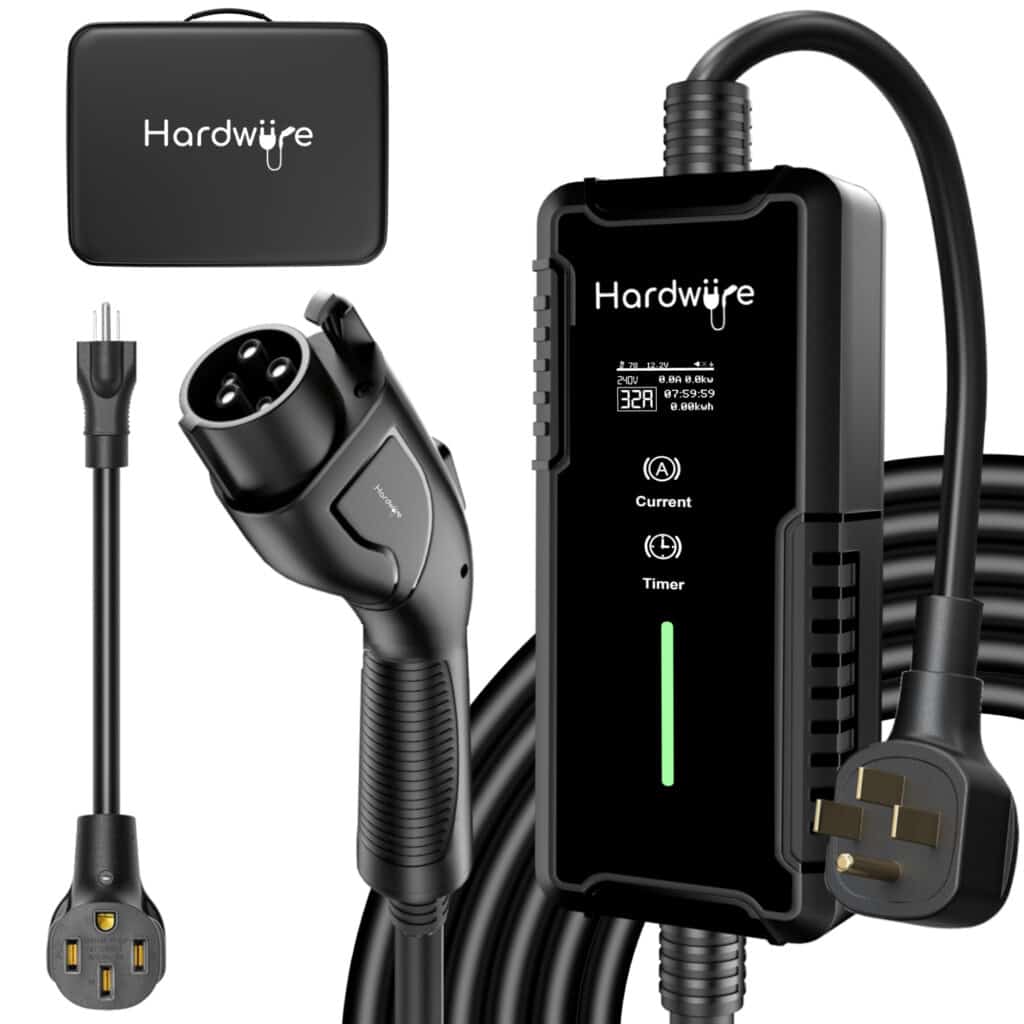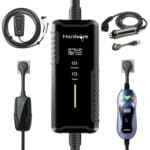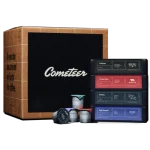Tried & Tested
For Tesla’s & All Other EVs
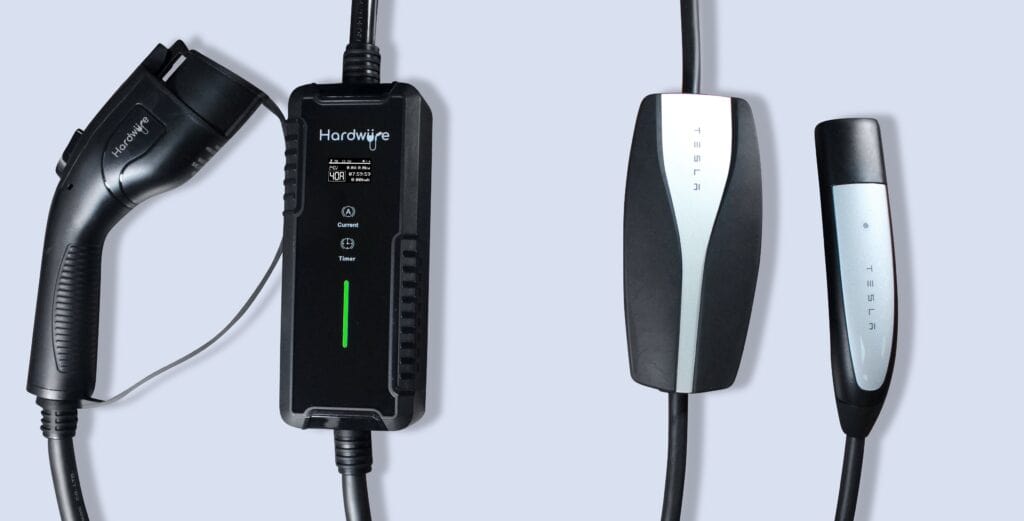
FYI
The most recent product testing was done during the week of March 8th, 2024. New Chargers are tested every 3 Months to stay up to date with new product launches, industry updates and changes to the EV Space. We are always testing new product to maintain industry standards.
Whether you’re a longtime electric vehicle owner or you’re still waiting for your first EV to leave the factory floor, you should consider investing in a Portable EV charger.
As of 2023 many automakers stopped including portable EV chargers with the sale of the vehicle as it was an incurred cost for them. Now if you want to buy one from the dealership it’s upwards of $500, which is pricey. Thankfully there are more comparable and affordable options for a Level 1 & Level 2 Portable EV chargers for both Tesla Vehicles & All Other Electric Vehicles (J1772 & CCS1 Charge Port) with the same benefits without getting price gouged by the dealership.
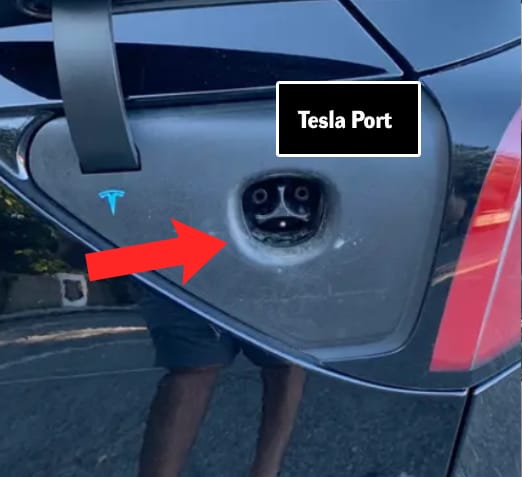
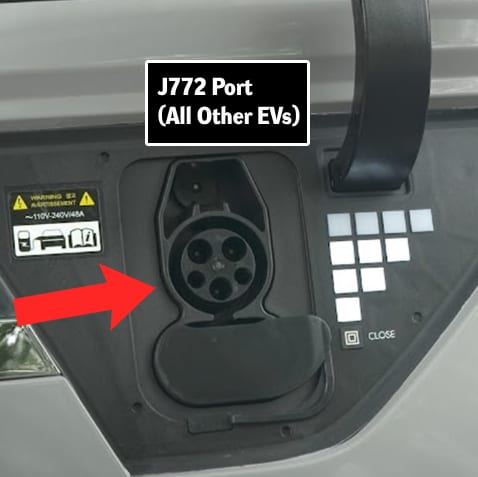
The great thing about a portable charger is that they can also be used as both a home or travel charger whether you’re charging at home every night or on the go.
After 30 hours of research and 100 hours of testing working directly with an electrician, we found the Hardwiire Portable 2-In-1 EV Charger: Dual Level 1 & 2 (110-240V) to be the best portable charger for EVs with all vehicles that have a J1772/CCS1 Port, whereas the Tesla Mobile Connector is best for Tesla’s.
Everything We Recommend
Our Pick
Hardwiire Portable
2-In-1 EV Charger
The Best Portable Charger For J1772 EVs (Non Teslas)
$249 from Amazon
Our Pick

Tesla Mobile Connector
The Best Portable Charger For Teslas
(NACS Vehicles)
$249 from Tesla
In the United States, 53% of electric vehicles (EVs) on the roads are Teslas, which charges with a NACS port/connector, also known as the Tesla Port. While an increasing number of car manufacturers plan to adopt the NACS connector for upcoming EV models, many existing ones still utilize the traditional J1772 connector/port. To address this diversity, our guide prioritizes chargers compatible with both J1772 and NACS connector.
Our Pick For a J1772 Charger (Non-Tesla Vehicles)
The Best J1772 Portable EV Charger
This is the Portable EV charger we’d use for travelling or every day home use. It’s got Level 1 & Level 2 Capabilities, it’s lightweight, and it comes with a lengthy, 23-foot cord, and adjustable current. Plus, it’s the most weatherproof model we tested, has good safety features and great after-sale customer support.

Despite not being the most expensive or the most affordable of other portable J1772 EV Chargers we tested, the Hardwiire Portable 2-In-1 EV Charger offers the same/more features as other models that were more expensive. The 2-year warranty is as good as it gets for a portable charger, as most others we tested only offered a 1 year warranty, so you’ll have plenty of time to make sure the charger works properly and meets your needs.
For configurations, it’s available in two current size configurations Max 32 Amp & Max 40 Amp and can also be adjusted based on your outlet size, whereas many of the models we tested only give you the option for only as a Level 1 OR Level 2 Portable Charger. This charger is also fairly compact, so it won’t take up much space in your trunk, and it’s lightweight enough to lift into use as a home charger, and also wrap it up to take it on the go. Also, it has a long, slim cord that can be neatly wound up into the carrying case or on the cable organizer if you decide to use this as a home charger.
If you’d like the option of installing your charger outside, the Hardwiire has the most weatherproof exterior of any portable chargers we tested, with a rating that shows it can shield the charger from superficial dirt, dust, oils, moisture, and even heavy rain or snow. It’s also rated to operate safely in temperatures between -22° to 122° Fahrenheit, and its plug has a protective rubber cap.
Our main gripes with this model is that since they are a start up in Canada, building and assembling chargers, their products are out of stock sometimes, so there is a bit of a wait time. When we ordered, there were a few left in stock and thankfully we were able get our hands on one. In light of the Hardwiire other great qualities, we think the majority of people will overlook this minor setbacks.
Max Current Rating(s): 32A or 40 A (Adjustable 8-40 or 8-32A)
Weatherproof Rating: IP65 (fully dust-proof and waterproof)
Plug Options: 240V (NEMA 14-50 – Level 2) or 110 (NEMA 5-15 -Level 1)
Warranty: Two Years
Our Pick For a Tesla Charger (Tesla Vehicles)

Tesla Mobile Connector
The Best Portable Tesla Charger
This is the portable Tesla charger we’d use for travelling. It’s got Level 1 & Level 2 Capabilities, it’s lightweight, and easy to use. Plus, it’s the actually an affordable OEM charger sold by a vehicle manufacturer, unlike other manufacturers selling for twice the price.

It doesn’t come as a surprise, our testing showed that the best portable charger for a Tesla is Tesla’s own, Mobile Connector. It’s not our top pick for all drivers, because connecting it to a J1772 EV requires a pricey third-party adapter that isn’t designed for everyday use. (Plus, since Tesla sells more EVs than the other car companies combined, its chargers are in high demand and often out of stock.)
But if you drive a Tesla, or you’re planning to buy an EV with a NACS port, it’s the best option available with that type of connector. Its maximum current rating of 32 Amps and is also bundled with adapters which are allow options of rotating between Level 1 & Level 2 Charging. When you plug in the Level 2 Adapter to the Tesla Mobile Connector, then plug it into the wall (Nema 14-50), it automatically sets the current to 32 Amps. When you plug the Level 1 Adapter into it, it automatically sets it to 12 Amps which is suitable for 110V plug.
The Tesla Mobile Connecter has a more narrow and lighter cable than the Hardwiire. It’s simply designed, and it’s backed by Tesla’s two-year warranty. This charger has a 20-foot cord, which is slightly shorter than the Hardwiire, but overall it is alot lighter in weight.
But it’s not quite as weatherized as our J1772 pick, but it’s still rated to handle mild rain, cold and heat but the instruction manual mentions the Tesla Mobile Connector should not be used when exposed to severe rain, snow or in an electrical storm. However, like the Hardwiire it is fine to operate in temperatures between -22° to 122° Fahrenheit.
The biggest downside to this charger is that it lacks that it lacks that extra few feet of cable. Thankfully it’s 20ft., but for some there are cases where those extra few feet matter if your vehicle runs out of battery somewhere. But after testing for a few days straight at random locations through the city, we never ran into a problem where we weren’t able to reach where we needed.
Max Current Rating: 12-32 A
Weatherproof Rating: IP55 (dust-proof and water resistance)
Plug Options: 240V (NEMA 14-50 – Level 2) or 110V (NEMA 5-15 -Level 1)
Warranty: Two Years
Who is this article for?
Whether you’re in the process of buying an EV or have owned an EV for a while and have always wanted to have that emergency Level 1 & 2 charger in your trunk or at home in the garage, this guide is for you.
EV drivers have widely varying lifestyles, needs, and priorities, but spending a few hundred dollars on a portable EV charger is likely a worthwhile investment in most cases. Per the U.S. Department of Transportation, over 30% of Public Charging stations do not work or are out of order, so you never know when you will need a portable charger to save you. Even if you don’t travel that often or put many miles on your EV, you still might want to have a charger on the road that lets you juice up quickly in the event of travelling and not being able to access a public charging station. Plus many use both the two chargers for home charging.
In addition to being a charging safety net, portable EV chargers often come with convenience you might not get from your home charger or public charging stations and fulfill your charging needs in cases such as:
- the option to take portable ev charger with you unlike not being able to take your hardwired home charger off the wall
- being there to save you when public charging stations are not functioning properly
- not having to rely on a smart phone app to operate a charger when your travelling and may not have access to wifi or data on your phone
- knowing you can charge your specific vehicle and not have to rely on an adapter to charge your vehicle
You may be a renter, a frequent traveller or you currently only have access to a Level 1 110V Charger Set-Up, or maybe you’re planning to upgrade to a Level 240V Charger Set-Up (NEMA 14-50 Outlet is what we recommend), both these chargers give you the option to charge on Level 1 or Level 2. Level 1 charging is obviously not as fast as Level 2 as the max you can draw is 12 amps, but it’s still a great option for those that are limited to a 110V outlet. Then when a 240V is available, you can charge at Level 2.
Why You Should Trust Us
As of writer of this guide, I spent 30 hours researching and 100 hours of testing EV Chargers and working directly with an electrician, I am an electrical engineer by trade, ev owner and have been a tech writer for more than a decade.
To write this guide, I interviewed Paul Vosper, CEO of Juice Bar (a manufacturer of commercial EV charging stations founded in 2009) about the history and current landscape of the EV charging industry. I worked directly with and interviewed Ozzie Moreal, CEO of Moreal Electric (a reputable electrician specializing in EV charger installation with more than 30 years of experience), and Dan Rupoli, Director of City Electric Supply (an EV charger consulting firm), about how to protect yourself when travelling with EVs and what is ideally needed in a portable charger. To better understand the needs of EV drivers, I interviewed Jodie Lebowicz, deputy director at Plug ‘N’ Drive (a nonprofit EV education platform); and William Martin, director of Shift Motors which is Canada’s largest used EV Car Dealership.
How We Picked and Tested
To find the most well-known and widely available makers of Portable EV chargers, we searched the websites of automakers and major retailers like Amazon, Best Buy, and Walmart, as well as industry publications such as Car and Driver, CleanTechnica, and Electrek. From there, we built a list of contenders based on the following features:
Costs less than $500: Aside from Tesla, the portable chargers we explored on other automakers’ websites were priced at around $500. Though initially considering pricier options with extra features, we soon realized the importance of finding a reasonably priced portable charger that matched home charger performance, without the smart features needed. Annual savings from switching to electric depend on various factors, but whether you spend $200 or $500 on a charger, your EV is likely to cover its cost within a year. According to a 2022 AAA study, powering an average EV could save approximately $2,100 annually compared to a traditional vehicle, excluding maintenance reductions.
Has at least a 32 A maximum current rating: With the increasing installation of NEMA 14-50 Plugs in parking lots, RV parks, camping sites, and public parking areas, enabling Level 2 charging, it became imperative for us to ensure that the chargers had a minimum current rating of 32 Amps (the Hardwiire also offers a 40 Amps option).
Has at least a 20-foot cord: Longer cords tend to be thicker and more unwieldy than shorter ones, but a lengthy cord is critical for an EV charger, to ensure it can reach the car’s charging port. A typical two-car garage is 20 to 24 feet wide, and the National Electrical Code (NEC) caps cord length at 25 feet. So we struck from our testing pool any chargers with a cord shorter than 20 feet.
Level 1 & Level 2 Plug Options: Level 2 Charging is obviously more ideal than Level 1 as you will get a faster rate of charge, but at this point, you need to be prepard to charge with Level 1 or Level 2. Both Tesla & Hardwiire Chargers give you the option to easily switch. For Tesla, when you switch the connector, it drops the amperage down to 12 Amps and for Hardwiire, when you plug in the Level 1 to Level 2 adapter, you just need to tap the “Current” Button on the screen to adjust it to 12 amps, if you’re charging with a standard North American 110V outlet.
Certified by a reputable testing facility: A seal of approval from any Nationally Recognized Testing Laboratory (NRTL) indicates that a product meets rigorous safety and compliance standards. So we required that each charger have a certification from one or more of these organizations. Example: UL, ETL or CSA Certified.
Has at least a one-year warranty: We think a year is ample time to use your charger on a regular basis and ensure that it’s not a dud. But two years ideal.
Has a carrying case: We preferred that each model in our testing pool included some type of carrying case, where you can tightly wrap up the charger and put it back into its carrying case. Not only does this keep your trunk looking tidy, but it helps prevent accidents and damage.
Has Good Product Support: Tesla being a giant in the EV space and being available for all of our questions, pretty much helped us with everything we needed when we stopped by the service center. Hardwiire’s customer service was more than exceptional – we called and left a voicemail and they literally called us back in an hour, answered all of our questions in depth and sounded really passionate and proud of their products and the EV space as a whole.
Portable & Also Gives An Option for Home Charging: We always like the option to use these chargers as both a home and portable charger. We preferred that each model in our testing pool could still charge as fast as some home chargers reaching up to 32 Amps and 40 Amps, but also easily being able to pack up and take on the road and charge as a portable EV charger.
To test the chargers, we borrowed a friends 2022 Tesla Model 3 Long-Range and used my 2023 Ford Mustang Mach-E for a week. The Tesla has the NACs port, and the Mach-E has a J1772 port, so testing with these EVs allowed us to confirm the chargers’ compatibility with both connector types.
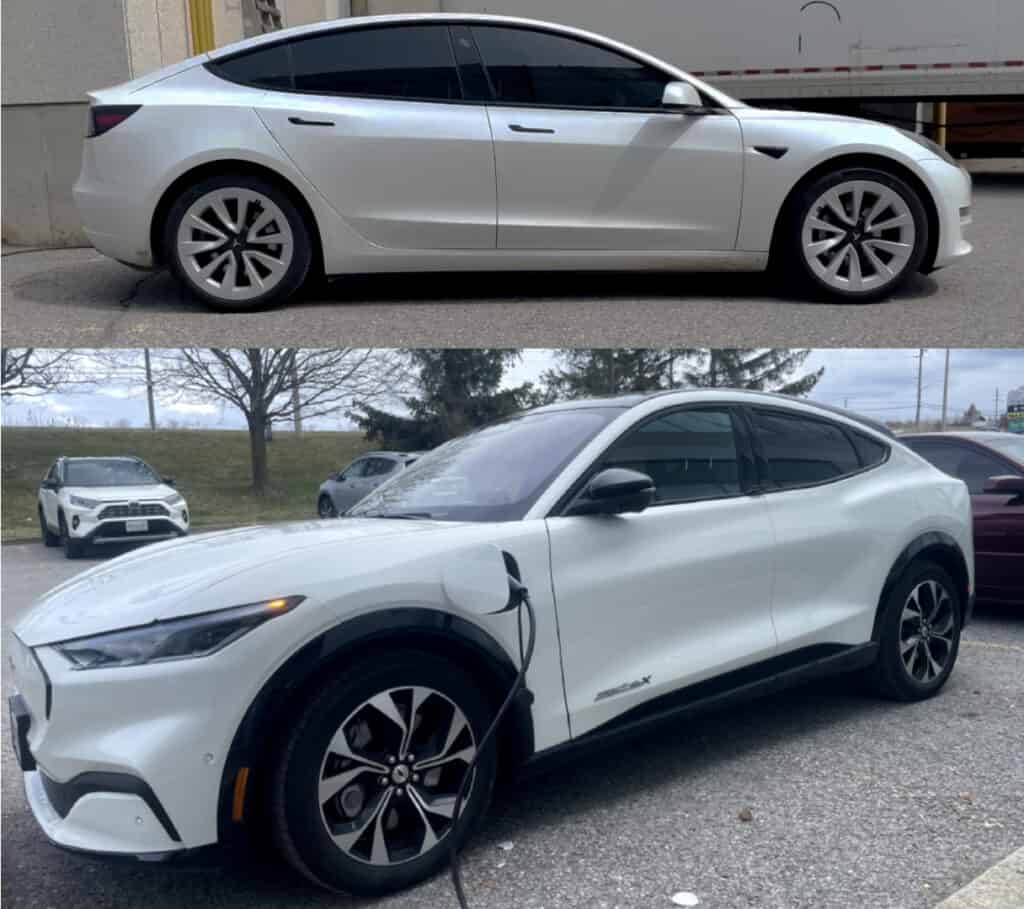
To test EV chargers, we used a 2022 Tesla Model 3 Long-Range AWD (left) and a 2023 Mustang Mach- E.
Over the course of two weeks, we drove the cars up and down country roads, visited friends and family, drove through the city, circled parking lots, and went to a drive in movie theatre to run the batteries down to a 40% charge. We then charged the batteries up to 100% and recorded three key measurements, as reported by the cars’ built-in software: time elapsed (in minutes), battery capacity (in kilowatt-hours, or kWh), and maximum current (in amps, or A).
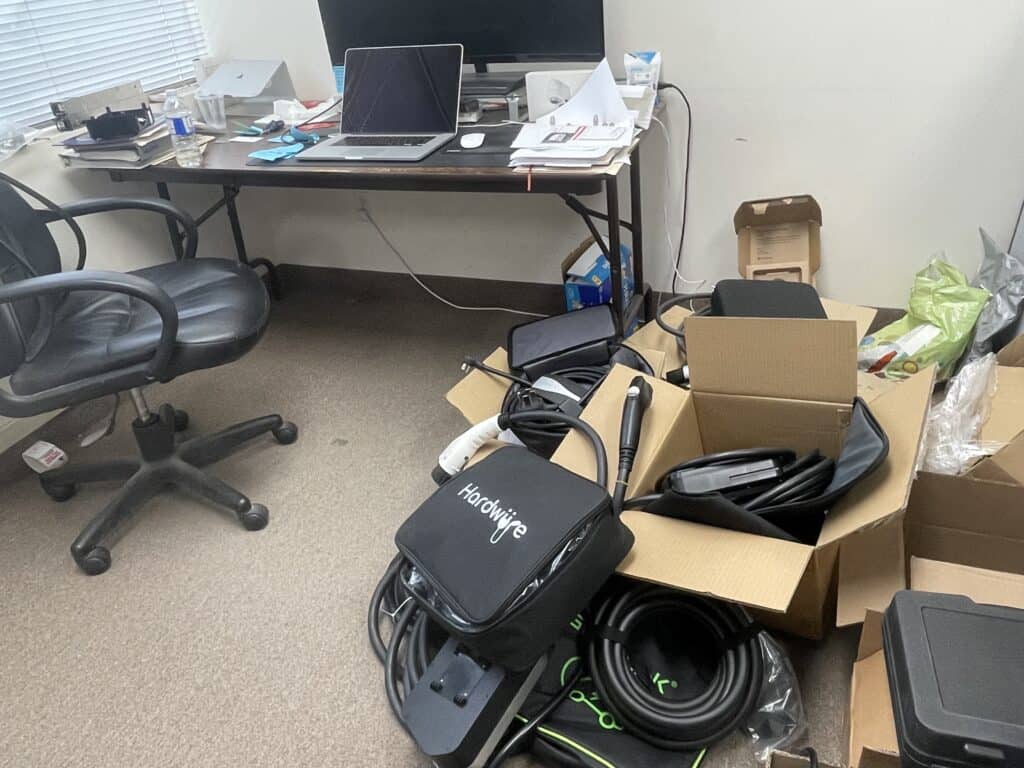
Our testing facility (my office) housed the EV chargers throughout our two-week testing period. (It’s a bit of a mess)
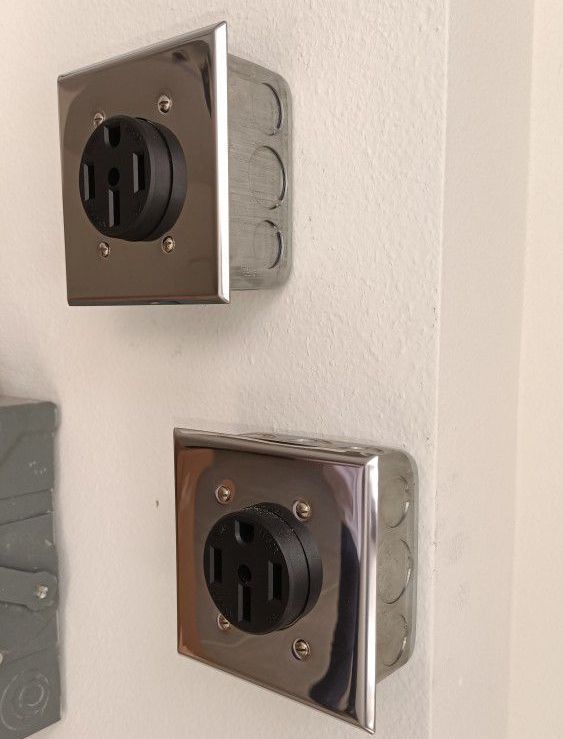
Before we began, we asked our friend Ozzie Moreal, an electrician, to put in 2 Level 2 Outlets at the back of the office. He checked both outlets with an electrical test kit to ensure the voltage and wiring were good to go (which they were). Then, we used a Kill A Watt power meter to double-check that its time, capacity, and amperage readings matched what the EVs’ screens showed (and they did).
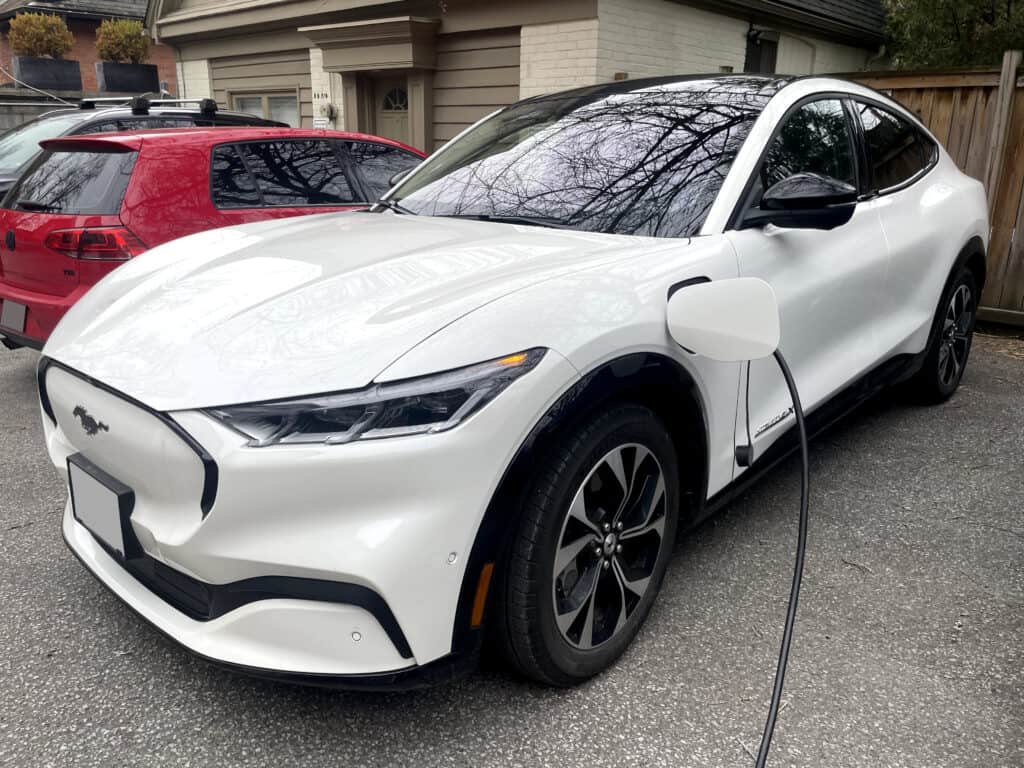
Charging at my buddies house with a Level 1 Adapter.
In addition to this extensive testing, we spent hours collecting data and documenting what we liked and didnt. Throughout our two-week testing period, we took stock of the overall look, feel, ease of use, and build quality of the chargers. Most importantly, we went on a few road trips and travelled to friends and families houses and tested the chargers when we needed them.
Our Pick For a J1772 Charger (Non-Tesla Vehicles)

The Best J1772 Portable EV Charger
This is the Portable EV charger we’d use for travelling or every day home use. It’s got Level 1 & Level 2 Capabilities, it’s lightweight, and it comes with a lengthy, 23-foot cord, and adjustable current. Plus, it’s the most weatherproof model we tested, has good safety features and great after-sale customer support.

The Hardwiire Portable 2-In-1 EV Charger is the charger we’d buy for ourselves. It works with every Full Battery EV or Hybrid EV with a J1772/CCS1 Port. As of this writing, it’s the best value J1772 portable charger we tested, while offering many of the same benefits of models costing hundreds of dollars more. With adjustable current (8, 12, 16, 20, 24, 32 or 40 Amps) It’s rated to charge as low as 8 Amps or as high as 40 Amps, which we confirmed in our testing. It can be used a Level 2 Portable Charger with a 240V Nema 14-50 outlet (Max 40 Amps), or you can use it with a 110V Nema 5-15 Outlet (Max 12 Amps). It’s lightweight, has a long cord, and boasts a higher weatherization rating than any other model in our testing pool.
It’s Powerful and Easy to Use. We noticed a lot more portable chargers are starting to sell portable chargers with smart features like an app, but when we travelled with the chargers that required app, many of them were such a hassle to set up because we had to pair it to wifi, etc. With the Hardwiire, it was just easy. Plug it in and set it to the current. We went to a few RV parks to test it, and at one of them it was drawing a full 40 Amps on Level 2 charging without having to set up an app or anything difficult; and the mach-e was charging at 40 Miles/Hour. What we learned from testing is that each car chargers at a different speed.
It’s a Safe Charger. The Hardwiire Portable 2-In-1 is ETL & FCC Certified, meaning it’s been tested and certified to be in accordance with national safety and compliance standards. It’s also backed by Hardwiire’s two-year warranty; this gives you plenty of time to travel with your charger, use it and get your monies worth.
2-In-1 Level 1 & Level 2 Plug Options. In addition to giving you the convenient factor of coming with a Level 1 Adapter for charging pretty much anywhere with a 110V Oulet, the Hardwiire comes with the Level 2 Plug maxing at 40 Amps which is actually as powerful as some home wall-mounted chargers. Many portable chargers that we saw being sold, only gave the option for Level 1 Only or Level 2 Only. In any case, we like that this charger offers more options than most—especially if you already have a 14-50 outlet in your garage from an old plug you used for power tools.
Easy to Travel With. The Hardwiire Portable 2-In-1 is relatively compact and lightweight, weighing just 11 pounds (including the cord). It comes with a durable insulated carrying case that keeps your cable organized and clean in your trunk, and wall mounted cable organizer for your wall incase you want to use it as a home charger.
It’s built for most environments. This charger is better suited to outdoor use when travelling more than any other one we tested. Its weatherproof rating is the best of the bunch (IP65, meaning it’s fully protected from dust and water). And its plug has a protective rubber cover attached by a short tether, further protecting the internal components from the elements. Also, like most models we tested, this one is rated to operate safely within a temperature range of -22° to 122° Fahrenheit. Plus they’re built in Canada and they have crazy winters, so they build this charger to pretty much hold up in any environment.
Customer Service, Technical Support & Instruction Manuals
Instruction Manual Clarity: With such a strong current of power and EV’s being somewhat technical, we wanted to make sure aside from just the chargers and the overall product being well built, the technical support and customer support was at the same level. With the products we tested, we read through every instruction manual and some were very clear and concise, others not so much, potentially because they were written in broken english with unclear directions, but Hardwiire’s was very clear and to the point.
Customer Support: We emailed or called support from every charger we bought. 50% of the companies never called us back, some took 2 days to respond to our email or didn’t have all the answers to what we wanted to know. But when we called Hardwiire, we called them and left them a voicemail and they called us back within an hour. We acted like we knew nothing about EV charging and they were very professional and patient with us and answered every single one our technical questions perfectly.
Accessibility to Support: A recent survey showed that over 40% of EV owners are 40+ and while some of them may be “techy”, many are not. Most EV owners just want a charger that works to charge their car at home and when travelling, nothing too difficult to use. We found that accessing support from many of these companies was very difficult, in most cases non existent. Hardwiire states they provide 24/7 Support, so we tested it by sending an email at 12:00 AM Midnight on a Friday night and low and behold they responded 1 1/2 hours later with an answer to all of technical questions. This was very important to us because support matters with these kind of products, especially when it’s very new for many people.
Our Pick For Tesla (NACs/Tesla Charge Port)
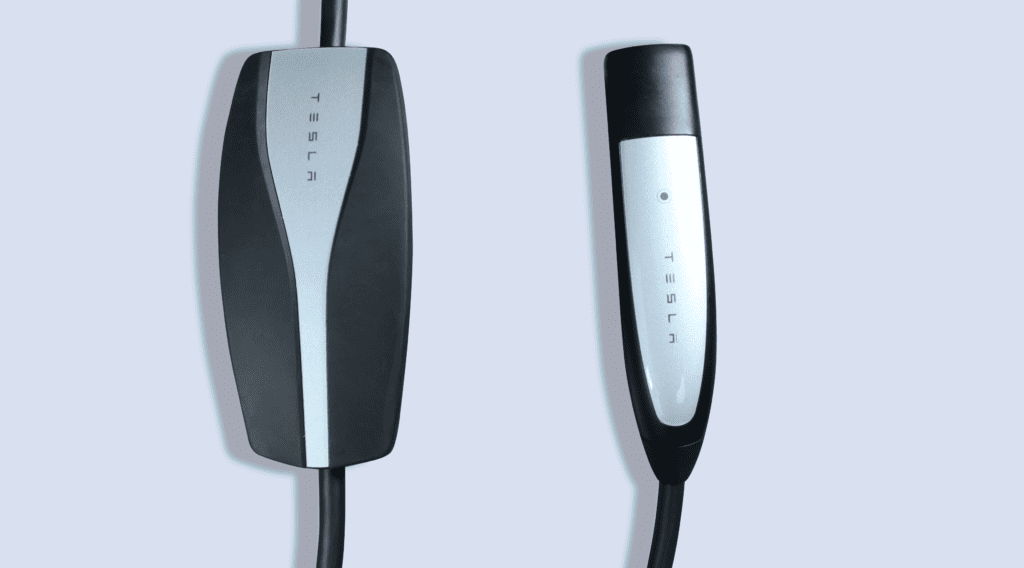

Tesla Mobile Connector
The Best Portable Tesla Charger
This is the portable Tesla charger we’d use for travelling. It’s got Level 1 & Level 2 Capabilities, it’s lightweight, and easy to use. Plus, it’s the actually an affordable charger sold by the vehicle manufacturer, unlike other manufacturers selling for twice the price.

The Tesla Mobile Connector is the Portable EV charger we’d buy if we were a Tesla Owner. As of this writing, it’s the best value NACs portable charger we tested, while offering many of the same benefits of models costing hundreds of dollars more. It’s rated to charge as low as 12 Amps or as high as 32 Amps, which we confirmed in our testing. It can be used a Level 2 Portable Charger with a 240V Nema 14-50 outlet(Max 32 Amps), or you can use it with a 110V Nema 5-15 Outlet (Max 10 Amps). It’s lightweight, has a 20ft. Cord, and really ease to use.
It’s Affordable And OEM. If given the option, many vehicle owners prefer to go with OEM hardware, but many of the vehicle manufacturers do not make their chargers affordable enough to go with this option. However, Tesla is different. Unlike other manufacturers, Tesla Mobile Connector is fairly priced and offers the valued deserved for the price.
Not Alot of Comparable Safe Options. There are now a few brands selling Portable Chargers for NACs/Tesla, but most of them are Chinese/Overseas companies that are peddling products with no safety certifications and poor construction quality. We tested the options that we saw online, but nothing compared in terms of safety and durability compared to Tesla’s OEM Mobile Connector.
2-In-1 Level 1 & Level 2 Plug Options. Like the Hardwiire – the crucial feature of conveniently switching from a Level 1 to Level 2 option is a must. My friend Brian (who lent us the Tesla) explained, how for the first two years before he owned a home, he used the Tesla Mobile Connector as his daily charger. He had a 14-50 pug installed in the rental garage which he used for level 2 and would pack it up and travel with it on the go. Definitely a must.
Note For Tesla Owners
For Tesla Owners: The Hardwiire Portable 2-In-1 can also be used to charge Tesla’s with a J1772 to NACS Adapter (These are included when you purchase a Tesla).
Conclusion
Overall, we hope you enjoyed reading our product testing experiment, and we hope it helped you become more knowledgeable about what’s important in a Portable EV Charger. Again here are our picks we recommend. Good luck charging!
Our Pick
Hardwiire Portable 2-In-2 EV Charger
The Best Portable Charger For J1772 EVs (Non Teslas EVs)
$249 from Amazon
(Currently On Sale)
Our Pick



